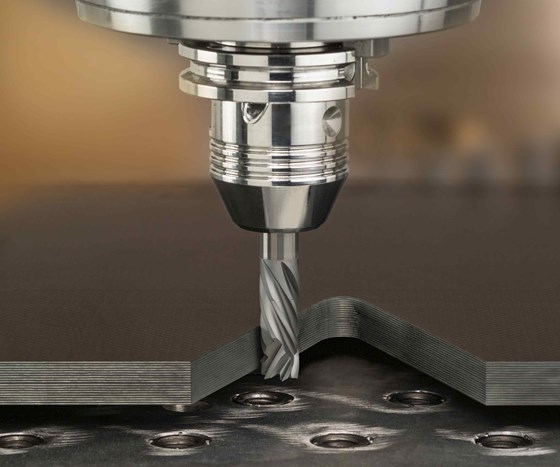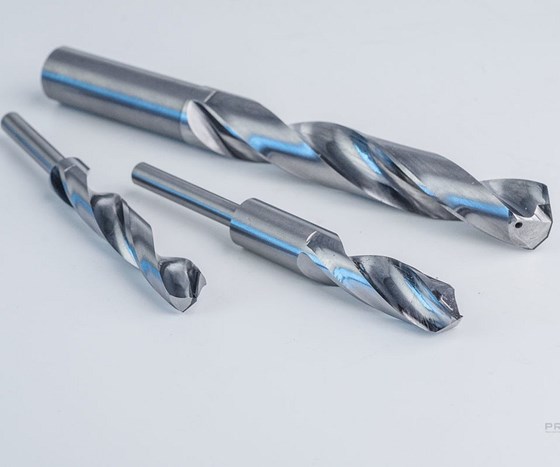Cutting, Drilling, Trimming and Finishing Composites
There is one basic operation employed almost universally throughout the composites manufacturing industry: CNC machining.
Composites manufacturing facilities are notoriously dynamic, and given the multiple combinations of fiber, resin and manufacturing processes available for making composite parts, no two composites manufacturing facilities are very much alike. That said, there is one basic operation employed almost universally throughout the composites manufacturing industry: CNC machining.
Every composite part, post-mold, requires some sort of finishing, ranging from the drilling of holes to the trimming of excess material. Ironically, particularly given the universality of CNC operations in composites manufacturing, one of the very worst things you can do to a composite part is drill it or cut it. Particular care is required because composites behave differently than metals do when they are drilled and cut. Their stacked-laminate construction makes them susceptible to delamination, fiber breakout and fiber tearing, particularly if cutting tools are worn or dull. Simply put, composites perform most optimally if left whole, but that is often too much to ask.
So, fabricators are left to do the next-best thing: Drill and cut carefully. Doing so is influenced by a variety of factors, ranging from optimized speeds and feeds to composites-friendly and composites-optimized cutting tools that can withstand the highly abrasive nature of composite materials. Fortunately, the latter are in ample supply at IMTS, if you know where to look. Below are some of the exhibitors featuring cutting tools made specifically for processing carbon-fiber and glass-fiber-composite materials.
In 2008, when Sandvik Coromant (Fair Lawn, New Jersey) acquired Precorp (Spanish Fork, Utah), it inherited what was, arguably, the largest cutting tool product line developed exclusively for composites machining. In the decade since, Sandvik has put its considerable weight behind evolving Precorp’s products, which uses polycrystalline diamond (PCD) in carbide blanks to fabricate a full line of drills, countersinks and reamers. Sandvik itself also has several products designed for handheld, power-fed and CNC-based composites drilling and cutting. These include the CoroDrill 452 for handheld drilling of carbon fiber, as well as carbon fiber/titanium and carbon fiber/aluminum stacked materials. Power-fed options include the 85 PT series CD10 PCD vein drill for carbon fiber, or the 40DH series for stacked configurations. As important, Sandvik has also developed a database designed to help composites fabricators pick the tool they need based on material and application requirements.
Iscar Metals Inc. (Arlington, Texas) has developed several products to meet a variety of composites machining and drilling needs. Iscar’s material technology is based on diamond-coated carbide. For drilling, the company offers the Sumocham series, designed for use with CNC, robotic or power-feed systems. For milling, Iscar has developed the Multi-Master tool systems with interchangeable heads, featuring a carbide head with brazed PCD tips. Primary applications for this range of tools are orbital milling, edging and ramping down. Also in the milling family, EPX is a line of end mills with opposite cutting-edge directions, intended for machining carbon fiber. Finally, also for milling, is the EPN-F family of solid carbide end mills, which features mill teeth divided into sections.
Amamco (Duncan, South Carolina) offers a line of solid carbide tools for routing and drilling composite materials. Routing products include a compression router, a slow spiral router, a diamond cut router and a special-purpose router. For drilling, Amamco offers the Double Margin drill, the Eight Faceted composite drill, the Diamond Coated (Helical) composite drill, the Straight Flute composite drill, the Short Taper diamond-coated drill, the Single Flute drill and a full line of drill reamers.
Crystallume’s (Santa Clara, California) tools feature the company’s Diamond Coated Carbide (DCC) material, grown from methane gas using proprietary chemical vapor deposition (CVD) technology. The material offers a hardness of 9,000 kg/mm2, a low coefficient of friction (0.05-0.7) and high tensile and compression strength. For composites applications, Crystallume focuses on aerospace manufacturing and offers DCC drills, 100-degree countersinks with threaded shank and diamond-coated insert, and a line of low-helix dreamers (drill reamers).
Seco Tools (Troy, Michigan) also specializes in CVD diamond coating and offers solutions for drilling carbon fiber and stacked materials, including the Diatreb square-burr-style drill, as well as the Diatrem square-end-mill-style drill. Also available is the Jabro-Composite range of diamond-coated, solid carbide and PCD end mills for the machining of glass and carbon-fiber composites.





